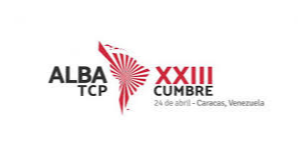
By Roberto Morejón
On the twentieth anniversary of its creation, ALBA, Bolivarian Alliance for the Peoples of Our America-People's Trade Treaty, seeks to gain new air, a difficult endeavor due to the situation that some of its members are going through and the international tensions. .
The ten member countries of the platform insisted at the 23rd summit held in Caracas on its validity for unity, dialogue, respect, cooperation and political agreement in the region.
Created from the thought and action of the leaders of Cuba, Fidel Castro, and of Venezuela, Hugo Chávez, ALBA outlined a work agenda adapted to the thorny times in the region.
The presidents, prime ministers and other representatives of the bloc's countries designed an updated course, with an eye toward higher objectives, in accordance with existing facilities.
Among the agreements of the twenty-third summit, the approval of ALBA 2030 stands out, with seven lines of work, to raise resources, the relaunch of PETROCARIBE and the creation of the ALBA Foods plan.
Likewise, coordination is envisioned to stimulate scientific and cultural development, the revival of the ALBA Health plan and an agency for mitigating the impacts of climate change.
As can be seen, the points contemplated are associated with the contexts and needs of the ALBA members.
Some of them, such as Nicaragua and Venezuela, are the target of coercive measures and Cuba suffers a tightened blockade, all carried out by the United States.
For the Venezuelan president, Nicolás Maduro, the 2030 agenda has an integrative, unifying and motivational character.
The intention is very valid in times when in Latin America there is an articulate counteroffensive from the right.
It is true that ALBA has not been able to escape the pressures of the current times and some of its star programs had to be tempered, due to the restriction of resources and the weight of sanctions and fences from the United States.
But as was evident at the Caracas summit, it is appropriate to evoke with satisfaction successes such as the literacy of almost five million people and the return of sight to more than six million patients through Operation Miracle.
With that progress in mind, to which is added the qualification of thousands of young people as doctors, it is possible today to chart courses, conditioned to current resources, without forgetting the social objectives envisioned by ALBA.

